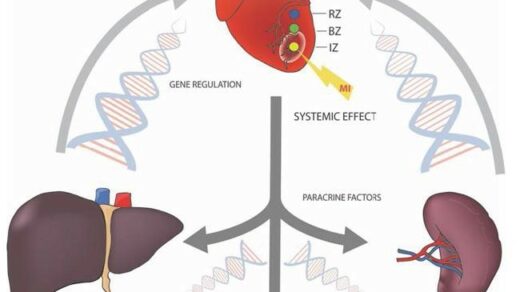Professor Vladimir Anisimov details the study he co-authored in an Oncotarget publication, titled: “Melatonin increases overall survival of prostate cancer patients with poor prognosis after combined hormone radiation treatment.”

The Behind the Study series transcribes videos of chosen researchers elaborating on their recent papers published in Oncotarget. Visit the Oncotarget YouTube channel for more insights from outstanding authors.
—
Professor Vladimir Anisimov details the study he co-authored in a Oncotarget publication titled, “Melatonin increases overall survival of prostate cancer patients with poor prognosis after combined hormone radiation treatment.”
Good morning, everybody. Let me introduce myself and our team. My name is Vladimir Anisimov. I am chief of Department of Carcinogenesis and Oncogerentology at Petrov National Medical Research Center of Oncology in Saint Petersburg. Professor Zharinov is head of Cardiology Department at Russian National Center. The Radiology Surgical Technology was open in 1918. Our Institute was open in 1927. Dr. Bogomolov and Dr. Neklasova work together with Professor Zharinov. Dr. Chepurnaya. Welcome them to the Saint Petersburg Clinical Scientific and Practical Center for Specialized Types of Medical Care.
Next, a couple of words about the history of our research.
In 1961, Dr. Mordecai Schwartz published a paper showing that patients die when the tumor reaches its critical size, approximately 10 in a 13th power. This depends on the tumor rate. There are lot of data on tumor doubling time, mainly paper devoted perforation, but cell loss, which is a very important part of them.
Natural history of tumor growth is much less a page in the papers. In a 1989 threshold, for the first time Dr. Zharinov reviewed the evolution that the patients have in cervical cancer, that patients who have fast-growing tumors have less cell loss than people/women who have cervical cancer slowly growing. It is this second paper by Gennady Zharinov, that our team show that cellular loss plays a principal in tumor growth.
You see, local prostate cancer has much more cell loss frequency in comparison to metastatic. Balance therapy is not the management in maintaining balance between proliferation and cell loss in order to increase the lifespan of cancer patients.
Efficiency of combined treatment of prostate cancer patients was improving by use of melatonin, a said element of balance therapy. History of melatonin, it was firstly isolated in 1958 by Aron Lerner from pineal gland of skull. In 1973, we have shown melatonin inhibits mammary tumors in mice. It was the first paper on this matter. In ’74, melatonin was discovered to enter enterochromaffin cells in intestines and some other tissue by Igor Kvetnoy. In 1980, it was shown by Yvan Touitou the transpiration of the age-related decrease production secretion of melatonin.

Walter Pierpaoli in 1987, first published a paper that melatonin increases lifespan in mice. And Russel Reiter from San Antonio, Texas, showed that melatonin is a potent antioxidant.
And we want this picture where you can see that melatonin inhibits tumorigenesis in a lot of sizes, localization, mammary cervix, colon, skin, soft, liver, lung. Majority (of this research) was done in our lab. We also study the effect of melatonin treatment in stomach cancer and colon cancer patients. The recurrence time was steadily increased by about 27% in patients with stomach cancer. Meta analysis of 10 randomized trials showed a decrease in mortality up to 0.66 in solid tumor patients. Some illustration of our research. melatonin sufficiently inhibits colon carcinogenesis induced by in 1,2-dimethylhydrazine in rats. It’s accomplished by the depression of mitotic index and stimulation apoptosis; tumor incidents was dramatically decreased. Then as the paper was published, we have shown the constant elimination increase acceleration of mammary carcinogenesis in transgenic mice.
A treatment with melatonin inhibits the expression of this oncogene. It decreases the number of tumors, size of tumors, and number of tumors per animal.
Just let me show a design of our study. It involved 955 patients with prostate cancer which received combined treatments of hormone radiation. Since 2000s up to last year, we treated 396 patients with melatonin. It was provided 30 minutes before sleeping, except in the winter, because winter levels of melatonin are good enough. The control group was not treated melatonin. It was 559 patients.
Groups were subdivided according to prognosis: Good prognosis, favorable prognosis for localized prostatic cancer, intermediate prognosis locally spread at metastatic prostatic cancer, but poor prognosis. It matched the maximum number of patients. The main results are shown on this slide. Good prognosis and the intermediate prognosis do not have strong effect on the survival of prostatic cancer patients. However, the medical median survival of melatonin-treated poor prognosis patients were more than two times higher than in control group: 40 to 64 months for control group, and 153 months treated with melatonin.
We conclude the method of balance therapy in improving survival cancer patients. We plan to continue on studying the factors that influence the rate of tumors growth, proliferation, and cell loss in cancer patients. At present, we have data on the good effect of melatonin in breast cancer in women, and then the uterine cancer in women. But melanoma was unsuccessful.
Thank you for your attention.
Click here to read the full study published in Oncotarget.
—
Oncotarget is a unique platform designed to house scientific studies in a journal format that is available for anyone to read—without a paywall making access more difficult. This means information that has the potential to benefit our societies from the inside out can be shared with friends, neighbors, colleagues and other researchers, far and wide.
For media inquiries, please contact media@impactjournals.com.



